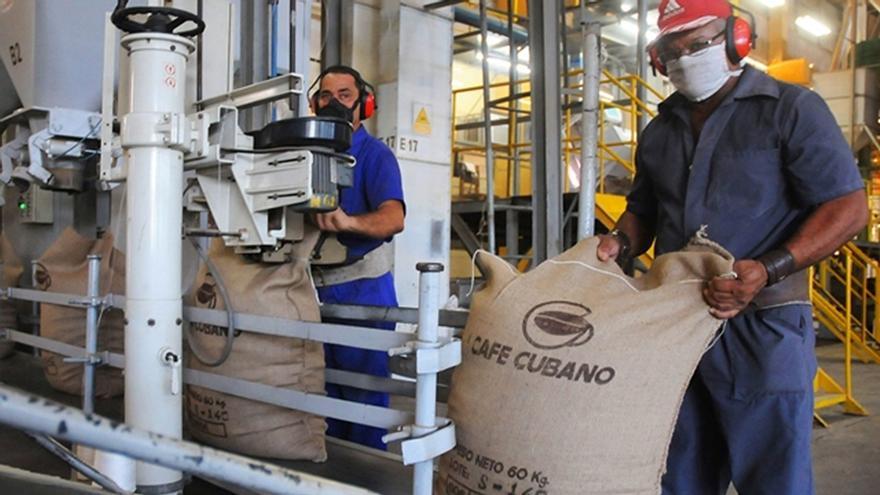
![]() 14ymedio, Madrid, 2 October 2023 — The Costa Rican company that shipped twenty-four tons of meat to Cuba in August will export flavored beverages, soft drinks, fruit purees, bottled water, coffee and eggs to the Island in the coming days. The company claims that it has the capacity to operate 150 containers and that it needs only three days to get the orders ready according to an article published by Prensa Latina.
14ymedio, Madrid, 2 October 2023 — The Costa Rican company that shipped twenty-four tons of meat to Cuba in August will export flavored beverages, soft drinks, fruit purees, bottled water, coffee and eggs to the Island in the coming days. The company claims that it has the capacity to operate 150 containers and that it needs only three days to get the orders ready according to an article published by Prensa Latina.
Daniel Torres and Veronica Alfaro, directors of Imagine Investments, told the official Cuban news agency that, after their successful experience with shipping meat to the island, they tried to “identify opportunities and needs that exist” in the Cuban market. As a result, they now plan to bring a wide variety of products into the country.
“We are happy. These are products that will enter this market at competitive prices, which will make them more accessible for Cuban consumers”
“We are happy. These are products that will enter this market at competitive prices, which will make them more accessible for Cuban consumers,” says Torres. So far, ten clients have placed orders for beverages, which will be the first product shipment to arrive.
The article adds that the company will also export “top-of-the-line coffee, with great flavor and aroma, and a roast tailored to Cuban tastes.” The news comes a few weeks after official media outlets in Holguín announced that government warehouses in the province have been out of coffee since May and that eastern Cuba will not be getting any more for the rest of the year.
This shortage has led to an increase in imports as indicated by the 2,500,00 dollars spent to purchase coffee from the United States. Cuban economist Pedro Monreal took the occasion to point out that imports make up a very small percentage of the coffee sold in the country’s local grocery stores. According to the latest statistics from 2021, the 17,100 tons of domestically produced coffee accounted for 97.7% of the total supply compared to just 400 tons purchased from abroad.
“The coffee crisis can be understood in the context of the recent cycle of contraction in production that began in 2019. Between 2018 and 2022, domestic production of roasted, packaged coffee declined a striking 44.5%. Less coffee is being produced now than during the Special Period,” Monreal pointed out.
The Costa Rican company’s coffee will most likely end up being sold at small and medium-sized businesses (MSMEs) or stores that sell goods for hard currency. The product profile, as described by Prensa Latina, suggests it will be too expensive for many consumers, though it could shift demand if those who can afford it stop consuming the cheapest alternative.
According to the directors of Imagine Investments, “a significant amount of fresh eggs” will soon begin to be imported thanks to an agreement with Costa Rican poultry farmers and approval from Cuba’s National Center for Animal Health. They did not indicate, however, how large the shipment would be or specify a delivery date.
The price of eggs, which have been scarce in Cuba partly as a result of the poor health of its chickens, has risen drastically in recent months
The price of eggs in Cuba has risen drastically in recent months owing partly to the poor health of the nation’s chickens. Eggs for sale on the black market can go for as much 3,000 pesos a carton. Meanwhile, buying a dozen eggs in the U.S. for shipment to Cuba costs seven dollars plus shipping.
“We have always enjoyed support from both countries,” say the directors, who will attend the next Havana International Fair. Imports could help increase supply and drive food prices down. However, some economists point out that the risks of relying too heavily on imports to meet consumer demand without promoting domestic production.
In a statement released last week, three independent Cuban farming organizations criticized these very practices. “We do not need food import companies like Gaesa [a business conglomerate run by the Cuban armed forces] and its MSMEs, but economic freedom to grow it in Cuba. Crushing agricultural producers while granting privileges to MSMEs is not the way to ensure the nation’s food supply,” the statement read.
____________
COLLABORATE WITH OUR WORK: The 14ymedio team is committed to practicing serious journalism that reflects Cuba’s reality in all its depth. Thank you for joining us on this long journey. We invite you to continue supporting us by becoming a member of 14ymedio now. Together we can continue transforming journalism in Cuba.
